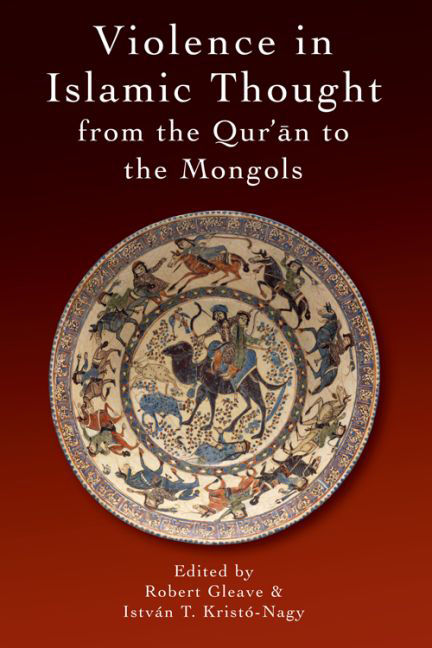Book contents
- Frontmatter
- Contents
- Dates and Abbreviations
- List of Figures and Tables
- 1 INTRODUCTION
- PART I JIHĀD AND CONQUEST: ATTITUDES TO VIOLENCE AGAINST THE EXTERNAL ENEMIES OF THE MUSLIM COMMUNITY
- 2 THE QUESTION OF DIVINE HELP IN THE JIHĀD
- 3 READING THE QURĀN ON JIHĀD: TWO EARLY EXEGETICAL TEXTS
- 4 IBN AL-MUBĀRAK'S KITĀB AL-JIHĀD AND EARLY RENUNCIANT LITERATURE
- 5 SHAPING MEMORY OF THE CONQUESTS: THE CASE OF TUSTAR
- PART II THE CHALLENGED ESTABLISHMENT: ATTITUDES TO VIOLENCE AGAINST THE STATE AND IN ITS DEFENCE WITHIN THE MUSLIM COMMUNITY
- PART III LUST AND FLESH: ATTITUDES TO VIOLENCE AGAINST THE DEFENCELESS, INTRA-COMMUNITARIAN VIOLENCE BY NON-STATE ACTORS
- Bibliography
- Index of Qurānic Citations
- General Index
4 - IBN AL-MUBĀRAK'S KITĀB AL-JIHĀD AND EARLY RENUNCIANT LITERATURE
from PART I - JIHĀD AND CONQUEST: ATTITUDES TO VIOLENCE AGAINST THE EXTERNAL ENEMIES OF THE MUSLIM COMMUNITY
Published online by Cambridge University Press: 15 September 2017
- Frontmatter
- Contents
- Dates and Abbreviations
- List of Figures and Tables
- 1 INTRODUCTION
- PART I JIHĀD AND CONQUEST: ATTITUDES TO VIOLENCE AGAINST THE EXTERNAL ENEMIES OF THE MUSLIM COMMUNITY
- 2 THE QUESTION OF DIVINE HELP IN THE JIHĀD
- 3 READING THE QURĀN ON JIHĀD: TWO EARLY EXEGETICAL TEXTS
- 4 IBN AL-MUBĀRAK'S KITĀB AL-JIHĀD AND EARLY RENUNCIANT LITERATURE
- 5 SHAPING MEMORY OF THE CONQUESTS: THE CASE OF TUSTAR
- PART II THE CHALLENGED ESTABLISHMENT: ATTITUDES TO VIOLENCE AGAINST THE STATE AND IN ITS DEFENCE WITHIN THE MUSLIM COMMUNITY
- PART III LUST AND FLESH: ATTITUDES TO VIOLENCE AGAINST THE DEFENCELESS, INTRA-COMMUNITARIAN VIOLENCE BY NON-STATE ACTORS
- Bibliography
- Index of Qurānic Citations
- General Index
Summary
Abd Allāh b. al-Mubārak (d. 181/797) was a famous traditionist, born in Marv in 118/736–7 or 119/737. He was a client to the Banī Ḥanẓala, and the Kufan traditionist al- Amash is said to have declared: ‘I will not relate ḥadīth to a group that includes this Turk.’ (This story may have come from speculation as to why he related so little of al-Amash, yet be nonetheless accurate as to his ethnic identity and prejudice against it.) He first visited Iraq in 141/758–9 in his early twenties. He collected ḥadīth in Yemen, Syria, Egypt, Basra and Kufa. Several stories of his munificence indicate that he was a wealthy trader. Numerous stories indicate an early adherence to Kufan jurisprudence or Abū Ḥanīfa in particular, from which he broke off late in life; for example, half of the biography of al-Ijlī (d. 261/874–5) is taken up by evidence of Ibn al-Mubārak's having renounced his early acceptance of nabīdh (date wine) – a notorious Kufan position. Presumably, the characterisation of his early adherence is more reliable than insistence on his repudiating it, stories of late repudiation apparently being designed to cancel a well-known but, to the ninth-century Sunnī party, embarrassing fact. (Ḥanafī literature, of course, celebrates Ibn al-Mubārak's admiration for, and dependence on, Abū Ḥanīfa – for example, our earliest extant biographical dictionary of Abū Ḥanīfa and the Ḥanafī school includes Ibn al-Mubārak among nine members of the generation of Abū Ḥanīfa's immediate disciples. Aḥmad b. Ḥanbal's own break with the Ḥanafiyya occurred around the time of Ibn al-Mubārak's death.)
There are also early stories of his participating in the holy war against the Byzantines, although not stressing feats of arms; for example, that he would spend the night in ritual prayer when he thought his comrades were sleeping. One of the earliest biographies states that he died returning from an expedition. Michael Bonner observes that feats of arms are increasingly stressed in later biographies. However, they do not show up, even in so late a collection as Abū Nuaym (d. Isfahan, 430/1038), Ḥilyat al-awliyā, which is concerned rather with his strenuous devotions, his prowess as a collector of ḥadith and his position vis à vis contemporary traditionists and jurisprudents.
- Type
- Chapter
- Information
- Publisher: Edinburgh University PressPrint publication year: 2015



